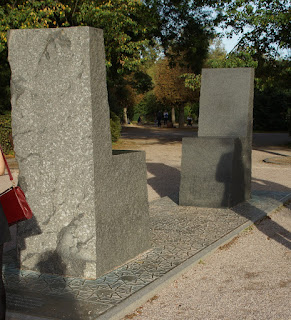10th to 15th Day: a Short Vacation and Working on Chapter 3
Having a break during the book-project was
not a bad idea. I think I really needed it. We have been in a very nice location near to Duisburg: Sauerland. The place is famous for its winter sport tours,
long threes, special architecture of the houses and walking in its mountains. J
and I had very relaxing days. Nevertheless I cannot deny that sometimes it was annoying
me to think about all things I have to do, applications, translation of concept
“dialogue” to two languages, preparing myself for a summer school at the end of
the August and of course the book.
this is a photo that i got my mobile there
Yesterday I started a normal working day;
though, I had a lot to do i could not work on the book. I had to answer to a lot of emails, I had to talk to a friend of mine who is organizing the 9. Hafis Dialog (I will write about it later), I had to send emails to two
persons and ask me to write a recommendation letters for me, for a specific job. To meet one of those who can write a letter for me, I went to a barbeque party of
refugees, in the Memelstr. However the person whom I was looking for was not
there. I managed to finally finish the book of Iranian presidents. So I have to
start wiring the book review, as well.
Today the temperature was
almost 40 degree. I stayed at home and worked on the chapter 3. This chapter
consists of three major sub-chapters. Firstly about foreign cultural policy of
Iran, secondly on Germany and third a conclusion. I go through the historical
facts how Germany and Iran started to mediate their nation abroad. In Germany
there is a long tradition. Even before Weimar Republic and then in Nazi time
there were very organized activities on art, theater, museum exchange and language courses. Of course firstly German language people in the region were the target
but then later a powerful image of German became the center of attention. In case of Iran the
situation has been different. From late Qajar the Iranian state through the cultural
activity of France realized how important its ancient civilization is. In time
of Reza Shah the state got more confident of its cultural heritage and tried to
use it for its political benefit; firstly domestically to project modernity in
Iran and then (just in secondary level) make an international image of itself. And
in time of his son, Mohammadreza Shah this trend was persuaded more seriously. Especially
Farah Diba, wife of Shah was very interested in creating cultural organizations
and supporting cultural activities. German cultural policy in its international
relations had a very meaningful change after the WWII. The Iranian foreign cultural
policy also had changed meaningfully after the revolution. These you can read
in my book, in chapter 3.
By the way now the dialog center of Iran is
connected to the center for intercultural dialogue. I am happy to play a role
in between. I will write about them later.
Ok, till tomorrow



Kommentare
Kommentar veröffentlichen